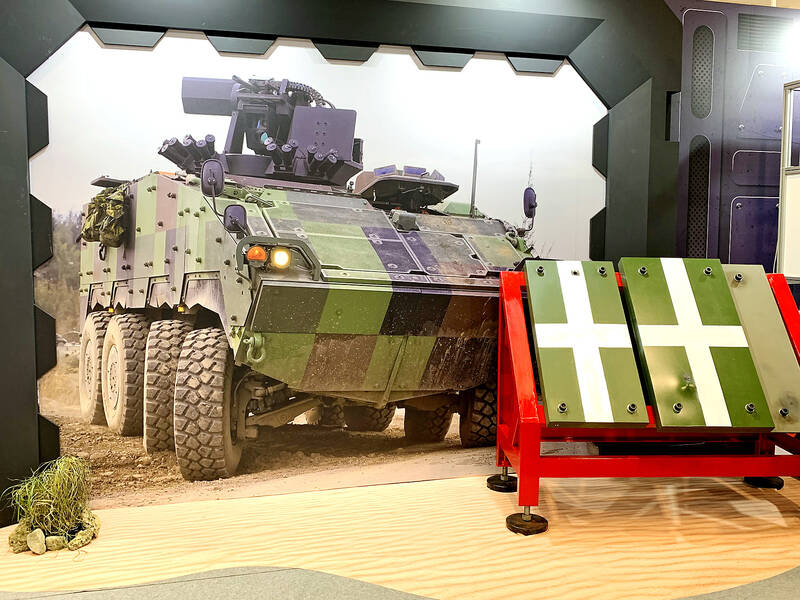The Chungshan Institute of Science and Technology has unveiled a new composite armor material and hydrogen fuel cells in a demonstration of the latest products from the Ministry of National Defense’s research and development arm.
The novel armor is to be utilized as a part of an add-on protection package for armored and soft-skinned vehicles, as well as helicopters and ships, an institute spokesperson said at the Taiwan Innotech Expo in Taipei on Thursday.
A CM-32 infantry fighting vehicle fitted with the new armor would be rated as being able to protect against large caliber weapons fire, significantly boosting the survivability of the platform and its crew, the spokesperson said.

Photo: Chen Chih-cheng, Taipei Times
A shell casing showcased at the exhibit suggested the institute’s live-fire trial used a 30mm chain gun, a more powerful weapon than the 25mm guns the frontal armor of the CM-32 was designed to withstand.
The armor design achieved a superior strength-to-weight ratio compared with its predecessors by replacing aluminum carbide with silicon carbide, the spokesperson said.
The protection packages can be customized to suit the user’s operational needs, they said.
The institute would not proceed with mass production of the armor until it receives interest from the armed forces, they said.
A display at the expo indicated that the armor used tiles arrayed in a honeycomb pattern between ballistic steel.
Ministry of National Defense records showed that the improved composite armor project, which cost NT$950 million (US$29.61 million), has passed operational trials and its adoption into service is pending.
The institute’s fuel cell uses a proprietary dehydrogenated powder-based technology for energy storage, enabling its use as a mobile power source, the spokesperson said.
The institute sources 80 percent of the parts for the project from domestic manufacturers, they added.
The system, which uses highly efficient hydrogen production and energy conversion, is low-cost, compact and easy to install, they said.
The technologies used in the cell have multiple potential military applications, including power generation in submarines, energy storage in uncrewed undersea vehicles and hydrogen rocket fuel manufacturing, they said.

SECURITY: As China is ‘reshaping’ Hong Kong’s population, Taiwan must raise the eligibility threshold for applications from Hong Kongers, Chiu Chui-cheng said When Hong Kong and Macau citizens apply for residency in Taiwan, it would be under a new category that includes a “national security observation period,” Mainland Affairs Council (MAC) Minister Chiu Chui-cheng (邱垂正) said yesterday. President William Lai (賴清德) on March 13 announced 17 strategies to counter China’s aggression toward Taiwan, including incorporating national security considerations into the review process for residency applications from Hong Kong and Macau citizens. The situation in Hong Kong is constantly changing, Chiu said to media yesterday on the sidelines of the Taipei Technology Run hosted by the Taipei Neihu Technology Park Development Association. With

A US Marine Corps regiment equipped with Naval Strike Missiles (NSM) is set to participate in the upcoming Balikatan 25 exercise in the Luzon Strait, marking the system’s first-ever deployment in the Philippines. US and Philippine officials have separately confirmed that the Navy Marine Expeditionary Ship Interdiction System (NMESIS) — the mobile launch platform for the Naval Strike Missile — would take part in the joint exercise. The missiles are being deployed to “a strategic first island chain chokepoint” in the waters between Taiwan proper and the Philippines, US-based Naval News reported. “The Luzon Strait and Bashi Channel represent a critical access

‘FORM OF PROTEST’: The German Institute Taipei said it was ‘shocked’ to see Nazi symbolism used in connection with political aims as it condemned the incident Sung Chien-liang (宋建樑), who led efforts to recall Democratic Progressive Party (DPP) Legislator Lee Kun-cheng (李坤城), was released on bail of NT$80,000 yesterday amid an outcry over a Nazi armband he wore to questioning the night before. Sung arrived at the New Taipei City District Prosecutors’ Office for questioning in a recall petition forgery case on Tuesday night wearing a red armband bearing a swastika, carrying a copy of Adolf Hitler’s Mein Kampf and giving a Nazi salute. Sung left the building at 1:15am without the armband and apparently covering the book with a coat. This is a serious international scandal and Chinese

COUNTERINTELLIGENCE TRAINING: The ministry said 87.5 percent of the apprehended Chinese agents were reported by service members they tried to lure into becoming spies Taiwanese organized crime, illegal money lenders, temples and civic groups are complicit in Beijing’s infiltration of the armed forces, the Ministry of National Defense (MND) said in a report yesterday. Retired service members who had been turned to Beijing’s cause mainly relied on those channels to infiltrate the Taiwanese military, according to the report to be submitted to lawmakers ahead of tomorrow’s hearing on Chinese espionage in the military. Chinese intelligence typically used blackmail, Internet-based communications, bribery or debts to loan sharks to leverage active service personnel to do its bidding, it said. China’s main goals are to collect intelligence, and develop a